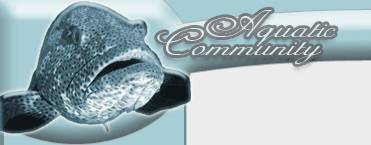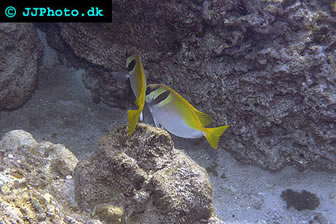Virgate Rabbitfish
Siganus virgatus
Siganus virgatus is known under several common names in English, such as Virgate Rabbitfish, Barhead Spinefoot, Barred Spinefoot, Double Barred Spinefoot, Double-barred Spinefoot, Doublebarred Spinefoot, Double-bar Rabbitfish, and Two Barred Rabbitfish.
Siganus virgatus has not been evaluated for the IUCN Red List of Threatened Species.
This species has venomous spines.
Geographical range, habitat and habits
The Virgate Rabbitfish is found in the Indo-West Pacific, from approximately 30°N to 25°S. It can be encountered from southern Japan to northern Australia, including areas such as south-eastern China, southern India, and the Malay Archipelago.
The Virgate Rabbitfish inhabits shallow coastal environments and is typically found near hard coral reefs and in sandy areas dotted with rocky patches and soft corals. Adults and large juveniles live in pairs and tend to seek out coastal reef flats and slopes, and they can also be encountered in estuaries. Small juveniles seek shelter in mangrove forests and can enter freshwater. When they move out to the reefs, they travel in small groups and hide among the corals. The Virgate Rabbitfish is tolerant of murky waters.
Size and appearance
The largest scientifically measured Virgate Rabbitfish was 30.0 cm / 11.8 in.
This fish can be recognized on the two bars that decorates its body. The first bar extends from the bottom of the mouth to the top of the head and masks the eyes. The second runs from the 4th-5th dorsal spine base to the base of the pectoral fin. The body is also adorned with blue spotted ocular bands and shoulder bands. Posterior and adjacent to the shoulder band you can see a silvery yellow area. The anterior nostril is encircled by a rim or short tube.
This species has stout, venomous spines.
Virgate Rabbitfish care
The Virgate Rabbitfish is a peaceful species and more outgoing than its relative the Foxface Rabbitfish. It is not advisable to house it in aquariums smaller than 100 gallons / 375 liters. It should not be housed with other species of Rabbitfish. Small juveniles can be kept in groups if the aquarium is big enough, while larger juveniles and adults should be kept alone or in pairs. In the wild, they usually occur in pairs. The Virgate Rabbitfish can be combined with most types of fish, because even aggressive species will fear the venomous spines and leave the peaceful rabbitfish alone.
The Virgate Rabbitfish is considered reef safe with caution. If not well fed in the aquarium, it can start nipping at and even devouring some species of soft corals and hard corals with large polyps.
The Virgate Rabbitfish will eat macro algae in the aquarium, including bubble algae.
Keep the water temperature in the 72-78° F / 22-25.5° C range. The recommended pH-value is 8.1-8.4, the recommended carbonate hardness dKH 8-12, and the recommended specific gravity 1.020-1.025.
Be extra careful when handling the Virgate Rabbitfish, because the venomous spines can deliver a painful sting. Some people have only mild (but painful) reactions to the venom while others get really ill and it is therefore advisable to seek medical attention right away instead of waiting for a possibly serious reaction to develop.
Feeding Virgate Rabbitfish
This herbivore species feeds primarily on seaweeds in the wild. It likes all sorts of macro algae, including bubble algae, and natural algae growth should be encouraged in the aquarium since this allows the fish to carry out its natural grazing behavior. Supplement the natural algae growth with fresh algae, algae based dry food and fresh vegetables. Some meaty food can be beneficial if given once in a while, but too much meaty food is unhealthy for this species.
Breeding Virgate Rabbitfish
The Virgate Rabbitfish is an egg-laying species.
Rabbitfish Articles
Bicolor Foxface Rabbitfish (Siganus uspi)
Coral Rabbitfish (Siganus corallinus)
Foxface Rabbitfish (Siganus vulpinus)
Magnificent Rabbitfish (Siganus magnificus)
Onespot Foxface Rabbitfish (Siganus unimaculatus)

